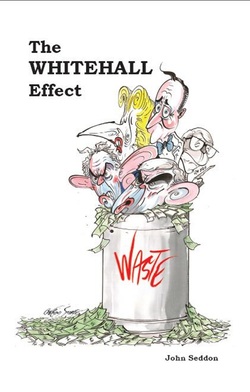The Whitehall Effect ~ John Seddon - Online Notes
|
Links below take you to the chapter notes:
Introduction 1. Prelude Part 1: The industrialisation of public services 2: Call centres 3. Back Offices 4. Shared Services 5. Outsourcing 6. Information Technology Part 2: Delivering services that work Introduction 7. A better philosophy 8. Effective change starts with ‘study’ 9. Better thinking, better design 10. ‘Locality’ working 11. IT as pull, not push Part 3: Things that make your head hurt 12. Targets and standards make performance worse 13. Inspection can’t improve performance 14. Regulation is a disease 15. It’s the system, not the people 16. Incentives always get you less Part 4: ideology, fashions and fads 17. Choice 18. Personal Budgets 19. Commissioning 20. Managing demand 21. Nudge 22. Procurement 23. Risk management 24. Lean 25. IT: features over benefits Part 5 Change must start in Whitehall 26. Beware economists bearing plausible ideas 27. Whitehall is incapable of doing evidence 28. Getting a focus on purpose |
27. Whitehall is systemically incapable of doing evidence
1] Office of the Deputy Prime Minister (ODPM), 2005, A Systematic Approach to Service Improvement Evaluating Systems Thinking in Housing, ODPM publications. 2] Gary Hamel and Polly LaBarre, ‘Dispatches From The Front Lines Of Innovation Management’, McKinsey Quarterly, November 2010. 3] John Seddon, 2005, Adult Social Care: a systems analysis and a better way forward. View 4] For example, PricewaterhouseCoopers (PwC) were participants in both the government-sponsored ‘Total Place’ and DECATS initiatives, whilst Operation QUEST placed a joint KPMG/Home Office consulting team in participating police forces for six months. 5] Alex Stevens, 2011, ‘Telling policy stories: An ethnographic study of the use of evidence in policy-making in the UK’, Journal of Social Policy, 40 (2). pp.237-256. 6] Richard Bacon and Christopher Hope, 2013, Conundrum: Why every government gets things wrong and what we can do about it, Biteback. 7] Paul Buxton, 2008, The Illusion of Control. How Government Targets and Standards Damage Local Government Services. View 8] This phrase was neatly summed up by John Kay of the Financial Times: “The British government’s admirable emphasis on evidence-based policy too often reduces, as it did in this case, to policy-based evidence: information provided supports the conclusions that those who prepare the studies believe policymakers seek.” See Financial Times, 6 September 2006, ‘How the migration estimates turned out wrong’. Byline: John Kay. View |

